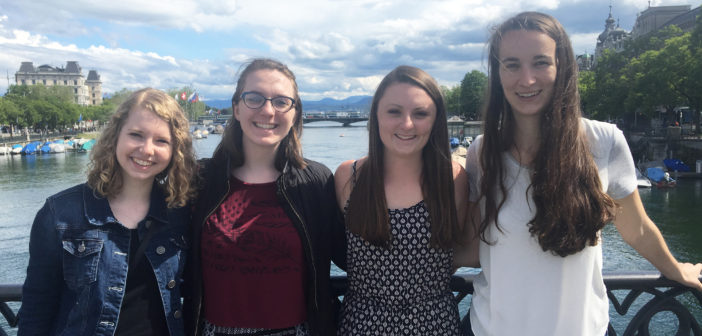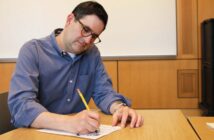In the wake of recent concerns about the resettlement of refugees throughout the world, Lehigh has been increasing its involvement with the issue by attempting to better understand and aid refugees who have resettled in the university’s own backyard — the Lehigh Valley.
Sarah Stanlick, the director of the Center for Community Engagement, said Lehigh has been involved with aiding refugees in the area for the past six years. She said the first wave began over 20 years ago with the arrival of Syrian refugees and immigrants.
Stanlick said a common misconception is that the majority of refugees in the area are from Syria, when in fact they are from a variety of different places including Eritrea, Iraq, Rwanda, Sudan and Burma. According to Stanlick’s research, the U.S. will admit 85,000 refugees from around the world in the 2016 fiscal year.
“In our commitment to be good global citizens, there was local action that we could also be taking,” Stanlick said. “One of the big shifts of the university is that we’re trying to do more things with our community partners, rather than for our community partners.”
Mountaintop project aims to learn about resettling migrants
This past summer, Lehigh undergraduate and graduate students worked with refugee communities in the Lehigh Valley and in Tübingen, Germany, through a Mountaintop Project called “Transitions for Refugees through Empowerment and Education.”
The project took place over 10 weeks, eight of which were spent working with refugees in the Lehigh Valley. The project was broken up by a two-week trip to Tübingen in mid-June where Lehigh students conducted a field study and had the chance to see how Germany was working with refugees.
Rebecca Ely, ’17, was involved with the project and said students had the chance to watch part of University of Tübingen’s admissions process by sitting in on interviews the university held with refugees.
Ely said the university had developed a semester-long prep course in which refugees could learn how to speak German and English. The refugees also had the chance to learn the history of the German language throughout the course. Ely said the course was designed to teach refugees everything they needed to be prepared to take university courses.
Ely said even though Lehigh students were unable to talk to any refugees during the project, the group learned a lot about the refugees’ background stories and desires to go to college just by observing. The group wasn’t able to talk to refugees because of confidentiality reasons and requests that weren’t approved in time by institutional review boards, which are established to review and approve research involving human subjects.
Ely said she was originally interested in the field study after noticing a lack of response from the U.S. in regard to aiding refugees. She said she wanted to see what the European Union was doing differently and how those practices could be applied to the U.S.
Ely learned one of the biggest problems is that refugees don’t want to lose their culture, but feel like they have to in order to better integrate into the U.S.
“We really need to work on making them feel comfortable, but also (be) accepting of their culture,” Ely said.
She said the most rewarding part of the project was having the chance to learn about refugees’ stories. By bringing these stories back to the U.S., Ely said she learned how to help improve the lives of refugees in the Lehigh Valley and challenge a lot of the stereotypes people have toward refugees, such as the idea that they are uneducated.
“I firsthand got to hear these people speak and tell their stories, and they’re basically just like us,” Ely said. “They’re just from a different part of the world.”
After returning home from Germany, Ely said students took what they learned and applied it to the surrounding area of Allentown, which is where the majority of the local refugee population lives. Stanlick said Allentown is a designated resettlement city and is also where the Refugee Resettlement Agency, Bethany Christian Services, is located.
Ely said one of the biggest problems refugees face in Allentown is they are unaware of the services available in the area. She said the Tübingen group created a 34-page guide to Allentown to help refugees feel more comfortable and learn about what is available to them in terms of resources, organizations and cultural places they can use to remain connected to their cultures and roots. They are still continuing to add to the guide.
As the central connecting point to Allentown’s Refugee Resettlement Agency, Stanlick works with Bethany Christian Services to develop different programs geared toward cultural orientation support services, fundraising and political advocacy.
Stanlick said the agency is usually a religious organization because of its infrastructure and compassionate commitment through its faith. The agency’s goal is to help refugees achieve full self-sufficiency in terms of housing, insurance, job training and language skills, within 180 days of arriving in the U.S.
Stanlick described Lehigh’s involvement with refugees as one of “transformative reciprocity.” She said Lehigh’s participation is not just a transaction from the university to its community but an experience from which everyone is able to gain something.
Stanlick said before all else, it is important to be educated and understand the process refugees go through before they even arrive in the U.S. The journey to get to the U.S. is a rigorous process that can last anywhere from two to five years and includes extensive background checks, homeland security checks and health checks.
There are many dehumanizing stereotypes surrounding refugees. Stanlick said many people believe they are “needy,” illegal and “here for the wrong reasons.” These stereotypes are perpetuated as a result of a general lack of knowledge. In actuality, Stanlick said, many refugees leave established careers and family roots behind to come to the U.S., which is something many people fail to understand.
“It’s a hard transition to remake yourself in a new place,” Stanlick said.
Stanlick said it is extremely important to listen to the needs and voices of the refugees to understand how community members can help through an asset-based lens. She added it’s important for community members to recognize that while the Refugee Resettlement Agency welcomes help and contributions from the community, it’s a small agency, so it’s easily overwhelmed.
Stanlick advises community members to become political advocates by writing to governors, members of Congress or representatives to encourage them to recognize their programs and efforts to support refugee resettlement, especially in states like Pennsylvania, which welcome and try to support refugees.
Stanlick said only a minority of refugees living in the Lehigh Valley report feeling dissatisfied or unhappy with their transitions to and stays in the U.S., which is a drastically different experience from other cities across the country. She believes a majority of people in the area show overwhelming support for refugees.
“The point is that there’s an opportunity there to welcome our new neighbors and have a stronger community,” Stanlick said. “It’s a fantastic job.”
No Lost Generation establishes a presence at Lehigh
In addition to being director of the Center for Community Engagement, Stanlick is also the faculty director of a new student club called No Lost Generation. The club focuses on de-stigmatizing refugees that are either in the U.S. or trying to come to the U.S. and also works to promote advocacy and education.
Lehigh is the second university in the country to establish a chapter of the club.
Ely, who is an international relations and psychology double major, said she decided to get involved with the club because she wants to pursue human rights work in graduate school.
“I thought it would be a really great opportunity to leave a lasting legacy at Lehigh about how we actually care about human rights,” Ely said.
The club will also be fundraising and sending the money to refugee camps abroad to help educate the children there. Stanlick said the club manages an emergency fund for the Refugee Resettlement Agency to help refugees get back on their feet upon arriving in the U.S.
Ely said her goal is to see the club become a lasting organization so that one day, when the refugee crisis is no longer called a “crisis,” the club can concentrate their efforts on other issues.
Bringing dialogue about refugees into the classroom
Visiting scholar Chiara Minestrelli offered her perspective on the European approach to the refugee situation.
Originally from Italy, Minestrelli obtained her Ph.D. in Australia and is now in her second semester of teaching at Lehigh. She is offering two courses, one of which focuses on the dilemmas, opportunities and possibilities of the refugee crisis in Europe.
Minestrelli said the word “crisis” is a problematic term because it implies the situation is something unexpected and new that people don’t know how to manage, which does not apply in this case. People have been seeking refuge throughout history and current refugee numbers are actually very small — in the hundred thousands — compared to numbers of people who enter countries in different ways and for different purposes — in the millions.
She said refugees within Europe don’t face the same struggles as those traveling to the U.S. because they only need to cross borders. However, in Europe there is a larger refugee population within a smaller space.
Minestrelli believes the EU’s refugee regulations are too outdated and need to be revised to include new definitions and legislation relevant to the current state of affairs. She said the central discussion is about security, especially because the main images around migration are those of illegality.
“The so-called emergency wouldn’t be an emergency if we had the structures and policies to actually welcome these people,” Minestrelli said. “Most European governments don’t have a plan, and the media are trying to portray this as a threat.”
Minestrelli said there are many illegal practices that are centered on politics and making money. There is a business behind illegal migration because migrants are a great resource in terms of cheap or free labor. She said those who capitalize on this issue don’t accept responsibility or hold themselves accountable.
“From my perspective, it’s very rooted in capitalism and liberalistic ideas about economy,” Minestrelli said. “So, in some ways, if you can profit from something, then why not.”
Minestrelli said getting her own Visa to come to the U.S. to teach was hard enough. The process was demanding and complicated and involved a lot of paperwork. She said she can’t even begin to imagine what refugees go through, or what they do if their Visa requests are denied.
“I can relate to their experience of wanting to move to improve (their lives),” Minestrelli said. “But then at the same time, they’ve got less chances than me just because they come from an area where they’re forced to, at times, become illegal in some ways.”
Minestrelli works with her students to help them understand every aspect and implication of the refugee crisis. She focuses on economic benefits that refugees offer as part of the workforce, as well as potential solutions to the crisis. Minestrelli urges students to look at the media as a source of information, but filter what it says because it can be biased and create negative stereotypes toward refugees.
“I think it is important for (students) to understand the phenomenon in its whole complexities from the business behind it, the motivations that are behind why a person decides to leave his or her country of origin, and also what they have to go through,” Minestrelli said.
Stanlick said Lehigh has a really good perspective on how the university wants to play a role in community affairs. She said seeing students flourish in these kinds of partnerships and environments is very rewarding.
“I love it when I realize you kind of turn on a light bulb in students for not just how they can help in the world, but also for some of that critical thinking about how the world works,” Stanlick said, “what injustices are happening, and how they can use their power and privilege of being university students to do positive things.”






Comment policy
Comments posted to The Brown and White website are reviewed by a moderator before being approved. Incendiary speech or harassing language, including comments targeted at individuals, may be deemed unacceptable and not published. Spam and other soliciting will also be declined.
The Brown and White also reserves the right to not publish entirely anonymous comments.